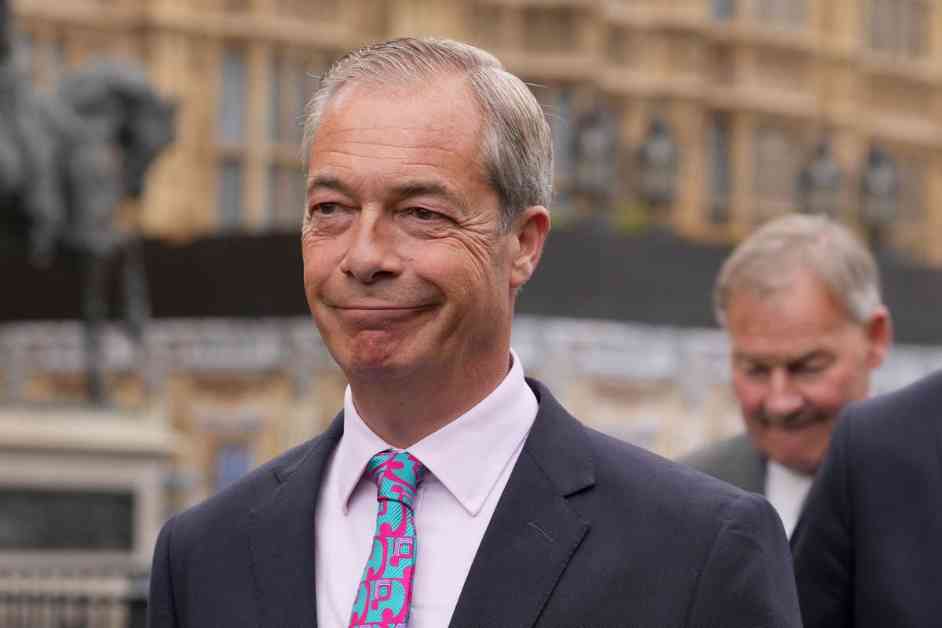Nigel Farage Steps Down as Majority Shareholder of Reform UK Ahead of Annual Conference
In a surprising move, Nigel Farage announced on social media that he will be relinquishing his majority shareholder position in Reform UK just one day before the party’s annual conference in Birmingham. The Clacton MP stated, “I’ve now made a decision. I no longer need to control this party. I’m going to let go.” This decision comes as a significant development for Reform UK, a registered company with Farage and deputy leader Richard Tice listed as persons with significant control.
The annual conference, set to take place on Friday, has been described as a pivotal moment for the party, which saw success in the recent election by securing five seats. However, controversy surrounds Farage’s claim that safety concerns have prevented him from holding constituency surgeries, with Parliament’s security services refuting this assertion. Critics have accused Farage of neglecting his responsibilities as a Member of Parliament, particularly due to his involvement in endorsing Donald Trump’s presidential campaign in the United States since July.
Farage’s decision to step down as majority shareholder raises questions about the future of Reform UK and its leadership. With the conference approaching, all eyes will be on the party’s next steps and how it plans to move forward without Farage at the helm.
Keir Starmer Faces Criticism Over Salaries Amid Budget Speculation
Meanwhile, Prime Minister Keir Starmer is under scrutiny for alleged discrepancies in salaries within his administration. The Conservative Party has accused Starmer of providing “gold-plated pensions” to his top team while making cuts to winter fuel payments for pensioners across the UK. This controversy has sparked debate over the distribution of resources and support for vulnerable populations.
Additionally, concerns have been raised about Sue Gray’s salary, the chief of staff for the Prime Minister. Reports indicate that Gray received a pay rise after the election, surpassing Starmer’s own salary. These revelations have fueled criticism of Starmer’s leadership and financial decision-making, with opposition critics calling for transparency and accountability in salary allocations.
Starmer’s responses to these allegations have been met with skepticism, as he navigates the delicate balance of addressing budget concerns while maintaining public trust. As speculation mounts about the upcoming Budget announcement, Starmer faces pressure to address these salary discrepancies and demonstrate his commitment to fair and equitable financial practices within his administration.
Reform UK Conference Highlights Farage’s Keynote Address
The Reform UK annual conference in Birmingham is set to showcase the party’s recent achievements and outline its vision for the future. With five MPs now representing Reform UK in Parliament, the party has seen significant growth in membership and enthusiasm among supporters. Nigel Farage, the party leader, will deliver a keynote speech at the conference, emphasizing the need for change and positioning Reform UK as a formidable opposition to the current Labour government.
The conference is expected to be a platform for Reform UK to distinguish itself from mainstream political parties and present a clear alternative to traditional political ideologies. Farage’s address will be a focal point of the event, offering insights into the party’s priorities and strategies moving forward. As Reform UK continues to gain momentum and establish its presence in the political landscape, the conference serves as a critical moment for shaping its identity and direction.
In conclusion, Nigel Farage’s decision to relinquish his majority shareholder position in Reform UK signals a significant shift within the party’s leadership. As Starmer faces criticism over salary allocations and budget speculation looms, the political landscape in the UK remains dynamic and full of challenges. The Reform UK annual conference offers an opportunity for the party to define its identity and goals, setting the stage for future developments in British politics.












